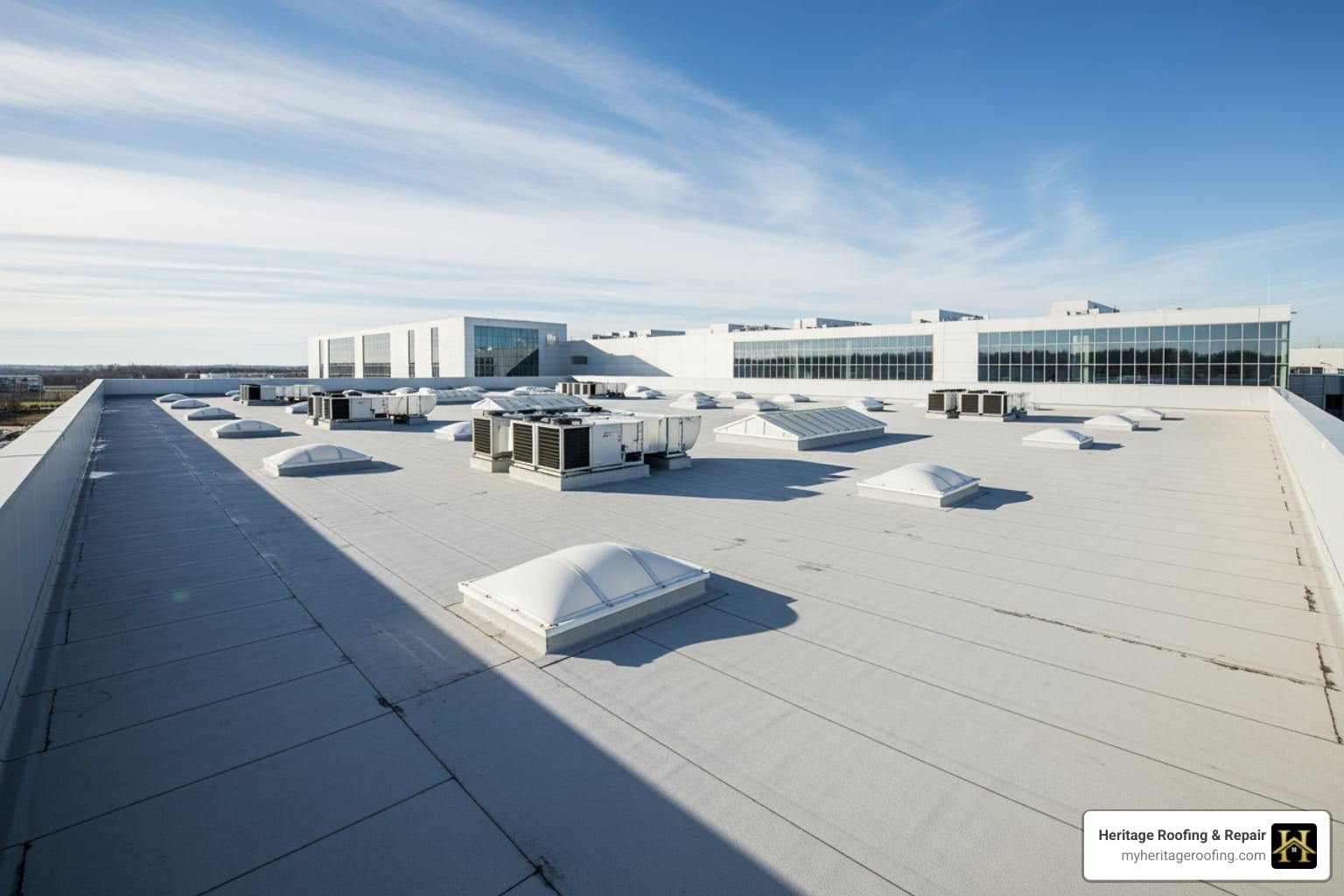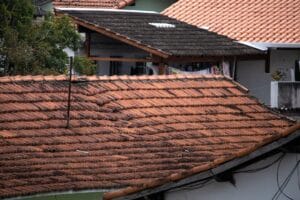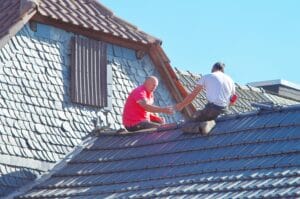Why Choosing the Right Commercial Flat Roof Matters for Your Business
A commercial flat roof is a critical investment for protecting your business operations, inventory, and employees from weather damage. The right system safeguards your property while minimizing maintenance and energy costs over its lifespan.
Your choice impacts everything from energy bills to business interruptions. TPO leads the market for its balance of cost and performance, while EPDM offers proven durability. For business owners in Northwest Arkansas, selecting a system that handles our region’s weather extremes—from summer heat to winter ice storms—is essential. The wrong choice can lead to costly repairs and operational disruptions.
Working with an experienced commercial roofing contractor ensures proper installation and long-term performance, which is just as important as the materials you choose.
I’m Rex Wisdom, owner of Heritage Roofing & Repair. Our family has installed and maintained commercial flat roof systems in Berryville and Northwest Arkansas for over 50 years, helping hundreds of businesses find the right solution for their needs and budget.
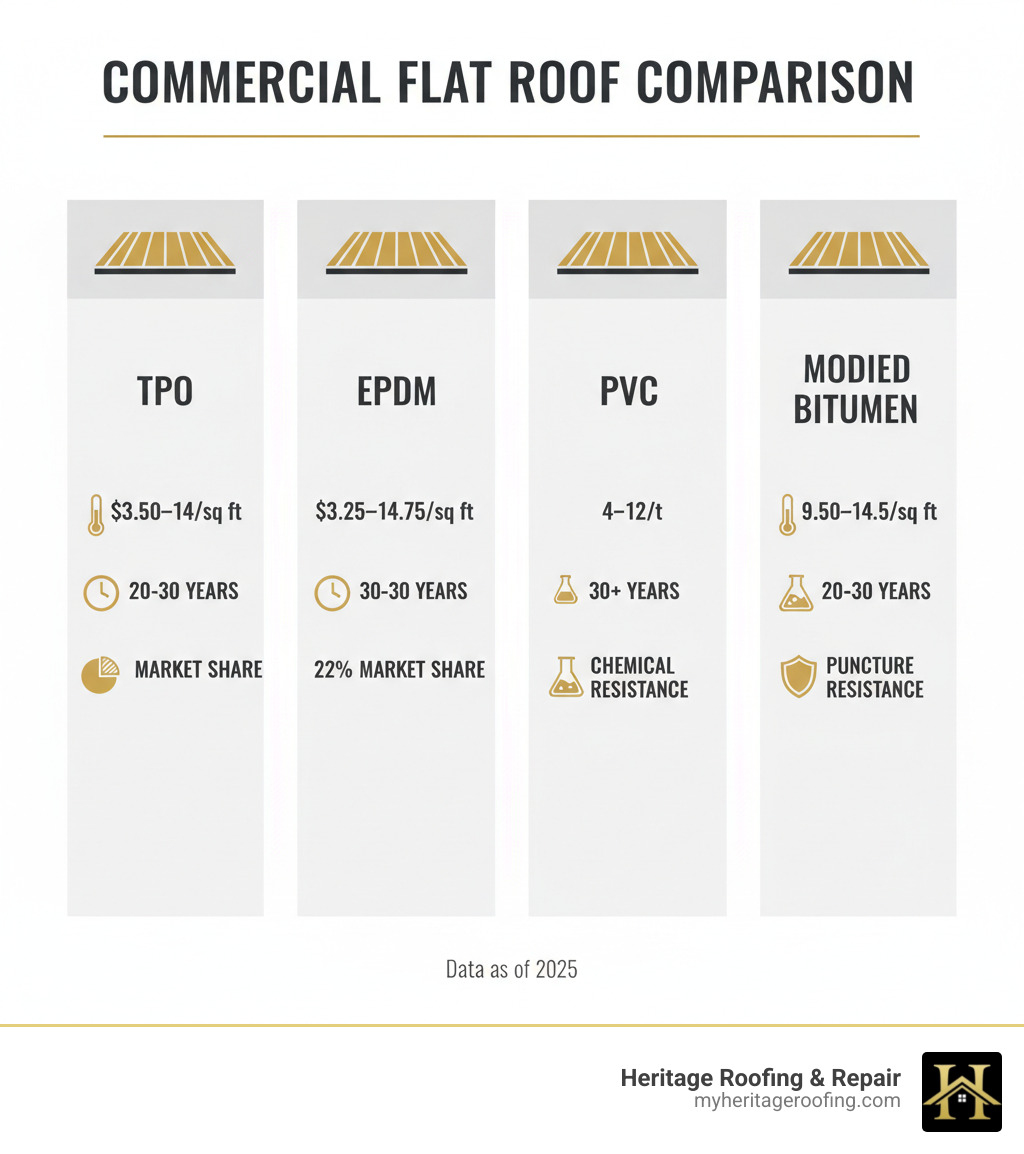
Comparing the Most Popular Commercial Flat Roof Systems
When choosing a commercial flat roof system, understanding your options is key. The industry offers several proven solutions, each with unique strengths for different buildings and budgets. Let’s explore the systems that dominate today’s market.
Single-Ply Membranes: TPO, EPDM, and PVC
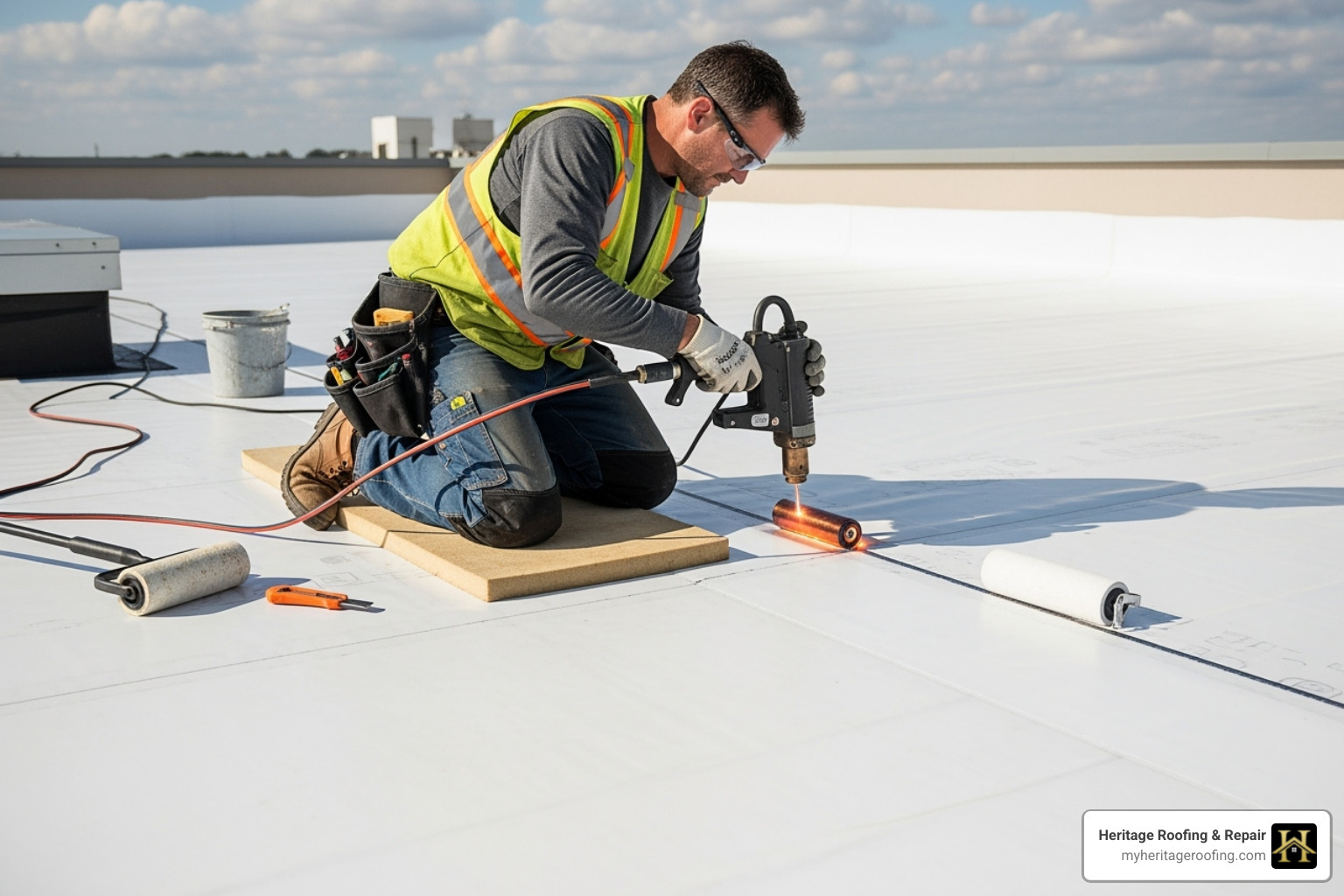
Single-ply membranes are large sheets of high-tech material that cover your roof in a continuous, waterproof layer. They have revolutionized commercial roofing because they’re lightweight, fast to install, and require less maintenance than older systems.
TPO (Thermoplastic Polyolefin) is the market leader, capturing 40% of new construction projects. It delivers an excellent balance of performance and value. Its white surface reflects sunlight, which can significantly reduce cooling costs during hot Arkansas summers. Seams are heat-welded to create strong, watertight bonds. A quality TPO installation typically costs between $3.50 and $14 per square foot and offers 20 to 30 years of reliable service.
EPDM (Ethylene Propylene Diene Monomer), or “rubber roofing,” has a 50-year track record of durability. Holding 22% of the new construction market, EPDM is incredibly flexible, expanding and contracting with temperature changes without cracking. While typically black, its energy efficiency can be improved with light-colored coatings. Installation costs range from $3.25 to $14.75 per square foot, and a well-cared-for EPDM roof can last over 30 years.
PVC (Polyvinyl Chloride) is the premium choice for buildings needing exceptional chemical resistance. If your facility produces grease or chemical vapors, like a restaurant or processing plant, PVC is ideal. Its heat-welded seams are incredibly strong, and the material resists damage from oils and fats. PVC costs between $4 and $12 per square foot and can last up to 30 years. Prefabricated systems, with up to 85% of seams completed in-factory, reduce installation errors and often come with superior warranties.
Here’s how these three systems stack up:
| Feature | EPDM | TPO | PVC |
|---|---|---|---|
| Cost per sq. ft. | $3.25 – $14.75 | $3.50 – $14 | $4 – $12 |
| Lifespan | 30+ years | 20 – 30 years | Up to 30 years |
| Seam Strength | Adhered/Taped (good) | Heat-welded (excellent) | Heat-welded (superior) |
| Key Pros | Durable, flexible, weather-resistant, proven longevity | Energy-efficient (reflective), UV-resistant, cost-effective | Chemical-resistant, strong seams, UV-resistant, prefabricated options |
| Key Cons | Can be punctured, typically black (unless coated) | Can become brittle in extreme cold, requires clean surface for welding | Can be more rigid, higher upfront cost than EPDM/TPO |
Multi-Ply Systems: Modified Bitumen (Mod-Bit) and Built-Up Roofing (BUR)
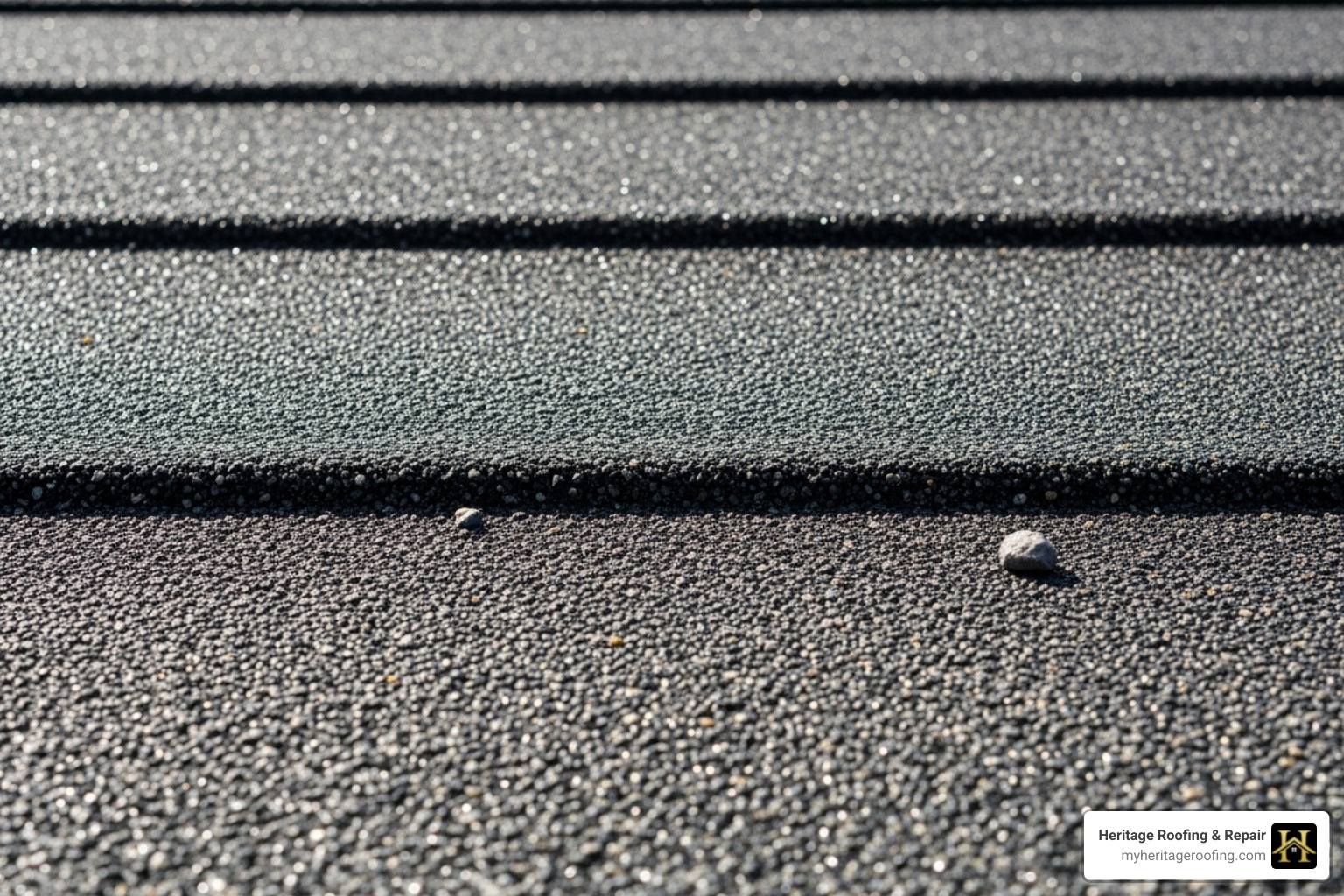
Multi-ply systems build protection through multiple layers, creating redundancy. If one layer is damaged, others continue to protect your building.
Modified Bitumen (Mod-Bit) combines asphalt with modern reinforcements like polyester or fiberglass. This creates a thick, durable commercial flat roof system that handles foot traffic better than single-ply options. It’s the third most popular system, with a granulated surface that reflects sunlight. Installation typically costs between $9.50 and $14.50 per square foot, with a service life of 20 to 30 years.
Built-Up Roofing (BUR) is the traditional flat roof, with over 100 years of proven performance. It uses alternating layers of asphalt-saturated felts and hot asphalt, topped with gravel or a cap sheet. The multiple layers make BUR incredibly tough against punctures. However, it requires at least twice-yearly inspections.
Safety matters when installing these systems. Torch-applied methods carry fire risks, especially over wood decking. The National Roofing Contractor Association has issued warnings about this practice. At Heritage Roofing & Repair, we prioritize safer cold-applied or self-adhered methods to protect your property and our crew.
Key Factors for Selecting Your Commercial Flat Roof
Choosing the right system goes beyond the material; it’s about finding the best solution for your building’s unique needs and local conditions.
Climate, Building Use, and Budget
Selecting the perfect commercial flat roof requires a complete picture of your business. Local weather is a huge factor. In Northwest Arkansas, your roof must handle scorching heat, hailstorms, and ice storms. Materials like TPO and EPDM offer the flexibility and UV resistance needed for our variable climate.
Building usage and rooftop traffic are also critical. A roof with multiple HVAC units or planned solar panels needs excellent puncture resistance, where Modified Bitumen or PVC with walk pads excel. For restaurants with grease vents, PVC’s chemical resistance is invaluable.
Budget is always a key consideration. While some systems have a higher upfront cost, they may deliver long-term savings through lower maintenance and energy bills. We help businesses find the sweet spot between initial cost and lifetime value.
Energy efficiency is a smart business strategy. Highly reflective “cool roofs” using white TPO or PVC can dramatically reduce cooling costs. We consider materials that meet Cool Roof Rating Council (CRRC) standards to maximize these savings.
Structural and Environmental Impacts
Your building’s structure also influences the best commercial flat roof choice. Wind uplift resistance is critical, and we determine the right attachment method (adhered, fastened, or ballasted) based on your building’s height and exposure.
Proper drainage design is essential, as ponding water is the enemy of any flat roof. We also look at the entire building envelope, as issues like masonry above the roofline can cause water infiltration during wind-driven rain.
Local building codes must be met or exceeded. For multi-story buildings, we address unique challenges like managing leak risks across multiple units. Prefabricated systems like Duro-Last offer faster installation with superior quality by completing up to 85% of seaming in a factory, reducing on-site errors and business disruption.
Fire Safety and Building Regulations
Safety is non-negotiable. We select materials with the appropriate fire ratings for your building type and ensure compliance with all codes. Safe application methods are paramount; we prioritize cold-applied, self-adhered, or heat-welded systems to eliminate the fire risks associated with torch-down applications.
Insurance requirements can also impact your choices. We help you steer these requirements and provide comprehensive documentation. Should storm damage occur, our team is experienced in handling insurance claims to ensure you receive the coverage you deserve.
Maximizing Your Investment: Lifespan, Maintenance, and Warranties
A new commercial flat roof is a significant investment. Protecting it involves understanding its expected lifespan and the maintenance required to achieve it.
Typical Lifespan and Maintenance for Each Roof Type
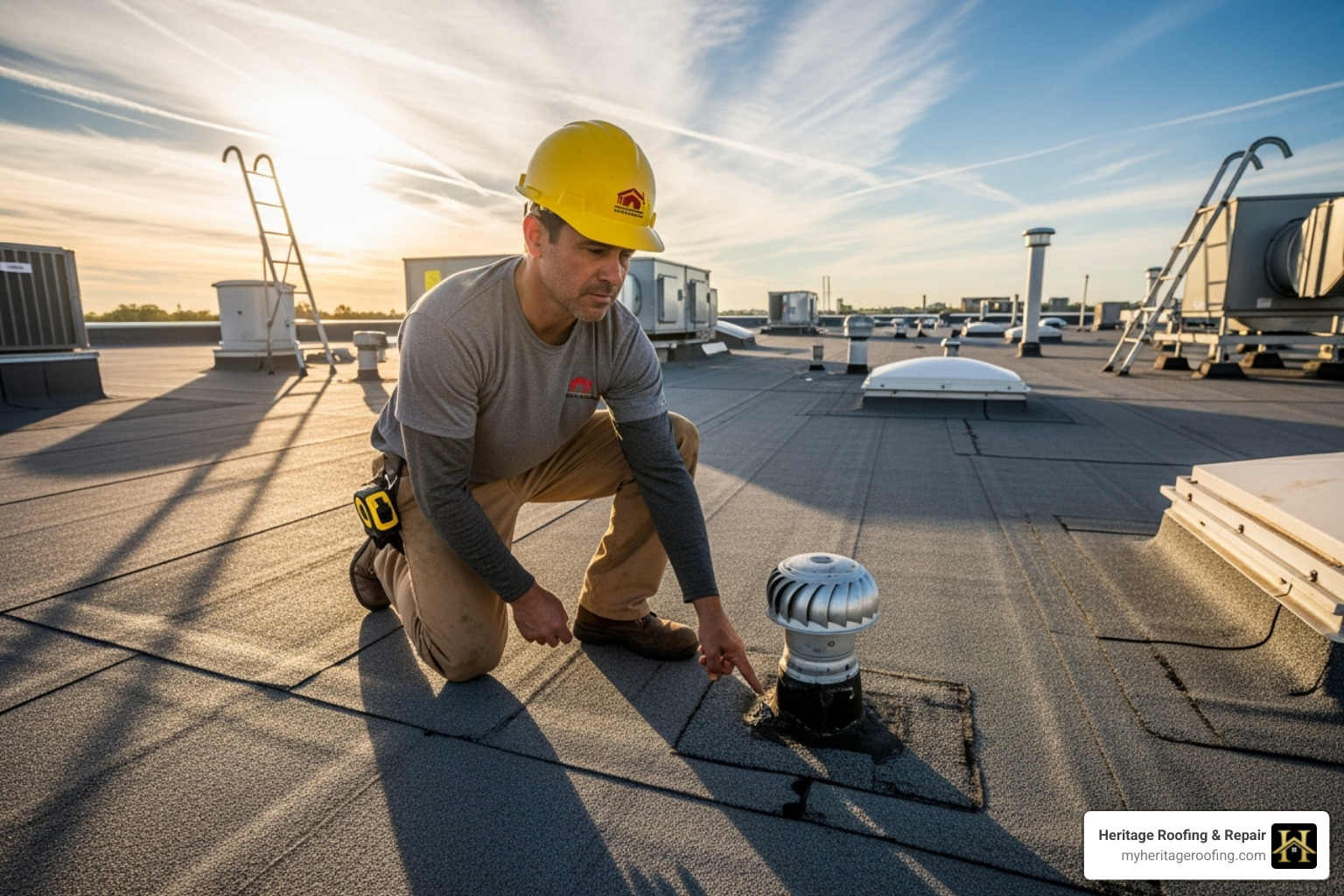
The lifespan of your commercial flat roof varies by material, but proper maintenance is the real game-changer. Neglect can cause a roof to fail in 10 years, while consistent care can help it exceed its expected lifespan by decades.
The difference between a 20-year roof and a 30-year roof often comes down to maintenance. We recommend twice-yearly inspections (spring and fall) to catch small issues before they become expensive problems. Key maintenance tasks include:
- Leak Detection: Checking for water stains, soft spots, or membrane damage.
- Debris Removal: Clearing leaves, branches, and dirt that trap moisture.
- Drainage Cleaning: Ensuring all drains, scuppers, and gutters are clear to prevent ponding water.
- Penetration & Flashing Inspection: Examining seals around HVAC units, vents, and other rooftop equipment, which are common leak sources.
The Role of Roof Coatings and Modern Innovations
Sometimes, enhancing your existing roof is more cost-effective than a full replacement. Roof coatings can extend roof life and improve performance. Silicone and acrylic coatings create a seamless, waterproof membrane over aging roofs, potentially adding 10-15 years of life for a fraction of the replacement cost.
The energy-saving benefits are also impressive. Reflective white coatings can reduce roof surface temperatures by 50-80 degrees, cutting cooling costs by up to 30%.
Green roof options are gaining popularity for their insulation and stormwater management benefits. Modern innovations like advanced polyiso insulation and hybrid systems also continue to improve commercial flat roof performance.
Understanding Your Commercial Roofing Warranty
Your warranty is your safety net. Most have two parts: the manufacturer’s material warranty (10-20 years for defects) and the contractor’s workmanship warranty.
Understanding the fine print is crucial. Premium systems may offer NDL (No Dollar Limit) coverage, which covers all repair costs without a cap and may include issues like ponding water. A contractor’s workmanship warranty protects you from installation errors, which is why we stand behind our work with comprehensive coverage.
Puncture protection and transferability are other valuable features to consider. The key to maintaining any warranty is proper maintenance and documentation. A small, documented repair today can prevent a denied claim tomorrow. The cheapest roof isn’t always the best value; quality materials and professional installation often provide the lowest total cost of ownership.
Find a Trusted Local Roofing Partner in Berryville, AR
Proper installation is just as important as the materials you choose. Working with a certified, insured, and experienced local contractor ensures your commercial flat roof is installed to the highest standards.
Heritage Roofing & Repair
3458 Arkansas State Hwy 221, Berryville, AR 72616
(870) 654-1164
Licensing and insurance are your protection. We carry full licensing and comprehensive insurance, so you’re protected from liability. Our local experience spans over 50 years in Northwest Arkansas, giving us knowledge of how our region’s weather impacts different roofing systems.
As a GAF Master Select™ contractor, a status only 3% of U.S. roofing contractors achieve, we meet strict standards for quality and reliability. This allows us to offer improved warranties, giving you additional peace of mind.
We provide expert guidance through every step, including detailed assessments and transparent pricing. The National Roofing Contractors Association offers helpful tips for selecting a contractor, emphasizing reputation and experience—all areas where we excel. Your commercial flat roof deserves the expertise that comes from decades of local experience.
Frequently Asked Questions about Commercial Flat Roofs
Business owners often have similar concerns when selecting a commercial flat roof. Here are answers to some common questions we hear in Northwest Arkansas.
What does the slope of a “flat” roof have to do with performance?
While called “flat,” commercial roofs must have a slight, positive slope (typically at least ¼ inch per foot) to ensure proper drainage. Without adequate slope, ponding water can occur, which adds significant weight stress to the roof structure, accelerates material degradation, and may even void your manufacturer’s warranty.
Are roof coatings a good alternative to a full replacement?
In many situations, yes. If your roof’s underlying structure is sound but the surface is aging or has minor leaks, a restorative coating can be a smart choice. Silicone or acrylic coatings create a seamless, waterproof layer that can extend your roof’s life by 10-15 years for a fraction of the cost of a full replacement, while also improving energy efficiency.
Will a new roof installation disrupt my business operations?
Minimizing disruption is a top priority. The level of disruption depends on the roof system chosen and the nature of your business. Systems like prefabricated PVC can be installed faster with less on-site work. We work closely with you to create a detailed phasing plan that schedules noisy or high-traffic work during off-hours whenever possible to keep your operations running smoothly.
Protect Your Investment with the Right Roofing Partner
Your commercial flat roof decision balances upfront cost, long-term durability, and your building’s specific needs. Whether it’s TPO’s energy efficiency, EPDM’s proven track record, or PVC’s chemical resistance, the best material won’t perform if it’s not installed correctly. Quality materials paired with expert installation make all the difference between a roof that protects your business for decades and one that causes constant headaches.
At Heritage Roofing & Repair, we’ve helped Northwest Arkansas businesses make smart roofing decisions for over 50 years. Our half-century of experience means we know what works in our local climate, from scorching summer heat to destructive ice storms. We are committed to finding the right solution for your specific situation, explaining your options in plain English so you can make a confident decision.
Ready to move forward with confidence? Contact us today for a free, no-obligation commercial roofing estimate. We’ll assess your building, discuss your needs, and provide clear, honest recommendations.
For more information about our full range of services, visit our homepage for expert guidance that has helped countless businesses protect their most important investment.
